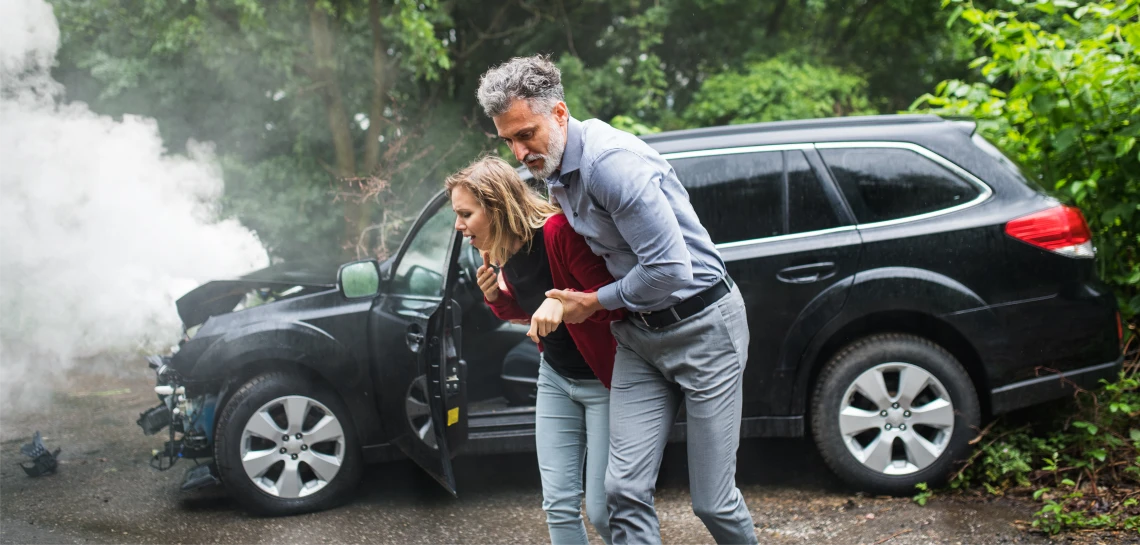
It is vital to report minor or major vehicle accidents to the police, irrespective of the damages done. Small-scale road incidents, commonly known as “fender benders,” are prevalent and often lack severe injuries. Understanding the initial steps is crucial:
- These minor traffic mishaps can occur in diverse settings such as parking lots, stop lights, or amidst slow-moving freeway traffic. Following the correct protocol after a minor car collision is imperative, regardless of location.
- The reporting process is guided by your state’s laws, outlining when and how to report even seemingly insignificant accidents to law enforcement or relevant authorities. Compliance with these regulations ensures a responsible approach to handling such situations.
- Furthermore, reporting traffic accidents to your car insurance provider is nearly always mandatory. This requirement stands, irrespective of whether you intend to file a claim under your coverage. (Get detailed insights on Does Health Insurance Cover Car Accident Injuries)
These reporting procedures are fundamental for a comprehensive and lawful resolution to minor car crashes.
What to Do After a Minor Car Accident?
Even in seemingly minor car accidents, where injuries are absent and vehicle damage is minimal, it’s crucial to follow specific steps:
- Ensure the exchange of contact information, insurance details, and driver’s license information with all parties involved in the accident.
- Capture photographs of the vehicle damage, the positioning of the vehicles, and the surroundings, including traffic signals and signage. Documenting these details is essential for understanding the accident’s dynamics.
- Contact local law enforcement through their non-emergency number to request an officer’s presence at the scene. This facilitates the preparation of a police report, providing an official record of the incident.
- Be mindful of your communication with others present at the scene. Caution in your interactions can prevent misunderstandings or potential complications later on.
Though seemingly meticulous, these measures contribute to a comprehensive and well-documented response, ensuring a smoother resolution to even the most minor car accidents. (Learn more on what to do after a car accident)
Do I need To Report a Car Accident To DMV or Law Enforcement?
Whether you need to report a car accident to the Department of Motor Vehicle (DMV) or law enforcement depends on your state’s regulations. In many cases, you must report accidents to law enforcement if they involve injuries, significant property damage, or if the damage exceeds a certain dollar threshold. Some states mandate reporting even for minor accidents. (Get more information on What Happens If Accident Damage Exceeds Your Car Insurance?)
The DMV may also require notification, but this varies by jurisdiction. Familiarizing yourself with your state’s specific requirements is essential, as failing to report when necessary could lead to legal consequences. Additionally, reporting to your insurance company is typically a universal requirement, irrespective of the accident’s severity, ensuring proper documentation and potential claims processing.
Do I Need To Report a Minor Car Accident To The Insurance Company?
Reporting a minor car accident to your insurance company is usually recommended. Even if the accident seems inconsequential, with minimal damage and no apparent injuries, informing your insurance provider is essential. Insurance policies often require timely reporting of any accidents, regardless of severity. Failing to report promptly could result in complications when you need to claim.
Reporting ensures the incident is documented, provides a comprehensive record of events, and protects you from legal or coverage issues. It’s a proactive step to ensure a smooth and transparent process with your insurance company.
What Should I Do If The Other Driver Agrees Not To file a Claim After a Minor Accident?
If the other driver agrees not to file a claim after a minor accident, you still should consider reporting the incident to your insurance company. Even in seemingly minor accidents, hidden damages or injuries may emerge later. Reporting the incident ensures that you fulfill your obligation to inform your insurer and provide a documented record of the event.
This proactive approach safeguards you in case issues arise or the other party changes their mind later on. It’s a responsible step, providing peace of mind and maintaining transparency in your insurance records.
Should I File a Claim After a Minor Car Accident?
Yes, filing a claim after a minor car accident is generally a good idea. Even if the damage seems minimal, reporting the incident to your insurance company ensures you fulfill your policy obligations. Sometimes, hidden damages or injuries may take time to be apparent.
Filing a claim creates a documented record of the accident, which can be crucial if issues arise later. It’s a simple and responsible step, providing you with the coverage and protection you need, even for seemingly minor incidents.
Involved In Minor Car Accidents? Contact a lawyer
An experienced car accident lawyer can provide valuable assistance even in minor car accidents. While the accident’s severity may be low, a lawyer can still help you navigate the legal and insurance aspects of the situation. They can guide you in understanding your rights, ensuring you receive fair compensation for damages, including hidden injuries that may surface later.
